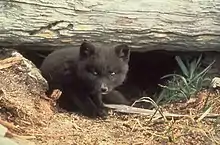cub
English
Pronunciation
- (UK) IPA(key): /kʌb/
Audio (US) (file) - Rhymes: -ʌb
Etymology 1
From earlier cubbe. Origin unknown. According to Pokorny, from Proto-Germanic *kubb-, from Proto-Indo-European *gup- (“round object, knoll”), from *gew- (“to bend, curve, arch, vault”).[1]
Compare Icelandic and Old Norse kobbi (“seal”), Old Irish cuib (“whelp”).[2] Compare also English cob.
Alternative forms
- cubbe (obsolete)
Noun

cub (plural cubs)
- A young fox.
- 1603, Michel de Montaigne, chapter 32, in John Florio, transl., The Essayes […], book II, London: […] Val[entine] Simmes for Edward Blount […], OCLC 946730821:
- a Childe of Lacedemon suffered all his belly and gutts to be torne out by a Cubbe or young Foxe, which he had stolne, and kept close under his garment, rather then he would discover his theft.
-
- (by extension) The young of certain other animals, including the bear, wolf, lion and tiger.
- (humorous or derogatory) A child, especially an awkward, rude, ill-mannered boy.
- c. 1601–1602, William Shakespeare, “Twelfe Night, or VVhat You VVill”, in Mr. William Shakespeares Comedies, Histories, & Tragedies […] (First Folio), London: […] Isaac Iaggard, and Ed[ward] Blount, published 1623, OCLC 606515358, [Act V, scene i]:
- O, thou dissembling cub! what wilt thou be / When time hath sowed a grizzle on thy case?
-
- (slang) A young man who seeks relationships with older women, or "cougars".
- Jason is only 15 and his girlfriend is 23, he's quite a cub.
- (obsolete) A stall for cattle.
- 1824, Walter Savage Landor, “Conversation XIII. Peter Leopold and President Du Paty.”, in Imaginary Conversations of Literary Men and Statesmen, volume I, London: […] Taylor and Hessey, […], OCLC 35810401, page 193:
- [...] I would rather have such a good mother in cub or kennel, than in my closet, or at my table.
-
- Synonym of cub reporter
- 1978, The Journalism Quarterly (volume 55, page 652)
- Swain has interviewed 67 reporters on 16 metropolitan dailies in 10 cities — from cubs to veterans — who talk candidly […]
- 2018, Randall S. Sumpter, Before Journalism Schools
- […] from competing publications and the editors of publications that might buy freelance material from cubs.
- 1978, The Journalism Quarterly (volume 55, page 652)
- (furry fandom) An adolescent furry character.
Derived terms
- cub reporter
- lion cub
- tiger cub
- wolf cub
Translations
|
|
- The translations below need to be checked and inserted above into the appropriate translation tables. See instructions at Wiktionary:Entry layout § Translations.
|
Verb
cub (third-person singular simple present cubs, present participle cubbing, simple past and past participle cubbed)
- To give birth to cubs.
- To hunt fox cubs.
- 1943, Stuart Palmer, The Puzzle of the Silver Persian
- He knew that, only a few hours from London, the Hunt was cubbing over his ancestral and much-mortgaged acres, while his own horse ate its head off in a stable.
- 1943, Stuart Palmer, The Puzzle of the Silver Persian
- (obsolete) To shut up or confine.
- 1624, Democritus Junior [pseudonym; Robert Burton], The Anatomy of Melancholy: […], 2nd edition, Oxford, Oxfordshire: Printed by John Lichfield and James Short, for Henry Cripps, OCLC 54573970:
- to fall from heaven to hell, to be cubbed up upon a sudden
-
Noun
cub (plural cubs)
- Acronym of cashed up bogan.
See also
- cub fos (etymologically unrelated)
References
- Pokorny, Julius (1959) Indogermanisches etymologisches Wörterbuch [Indo-European Etymological Dictionary] (in German), volume 2, Bern, München: Francke Verlag, page 393-398
- Douglas Harper (2001–2023), “cub”, in Online Etymology Dictionary.
Anagrams
- BUC, UBC
Albanian
Etymology
From South Slavic; compare Serbo-Croatian ćȕba ‘tuft, crest’, Polish czub ‘crest; tip’.[1] Mann posits that the noun might be from Gothic 𐌸𐌹𐌿𐍆𐍃 (þiufs), although this is unlikely.[2]
Adjective
cub m (feminine cube)
- bobtailed, having a docked tail
- awnless (of grain)
Derived terms
- cubak
- cuban
- cubë
- cubel
- cuboj
Noun
cub m (indefinite plural cuba, definite singular cubi, definite plural cubat)
- mountain bandit, robber, brigand, highwayman
- (figurative) crazy hero, crazy fool
Derived terms
- cubar
- cube
- cubni
- cubnisht
- cubnoj
References
- Orel, Vladimir (1998), “cub”, in Albanian Etymological Dictionary, Leiden, Boston, Cologne: Brill, →ISBN, page 48
- S. E. Mann, “The Indo-European Vowels in Albanian”, Language 26 (1950): 384.
Catalan
Etymology
From Latin cubus.
Pronunciation
- (Balearic, Central, Valencian) IPA(key): /ˈkup/
Audio (file)
Noun
cub m (plural cubs)
- cube (regular polyhedron having six square faces)
- (mathematics) cube (the third power of a number)
Related terms
- cúbic
Further reading
- “cub” in Diccionari de la llengua catalana, segona edició, Institut d’Estudis Catalans.
Romanian
Etymology
Borrowed from French cube, from Latin cubus.
Noun
cub n (plural cuburi)
- cube
Yola
Etymology
Borrowed from Irish caobach.
Noun
cub
- A small gull.
References
- Jacob Poole (1867), William Barnes, editor, A Glossary, With some Pieces of Verse, of the old Dialect of the English Colony in the Baronies of Forth and Bargy, County of Wexford, Ireland, London: J. Russell Smith, page 32